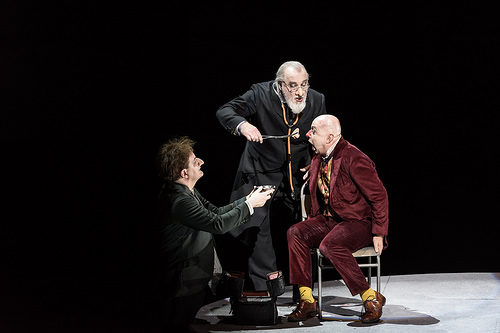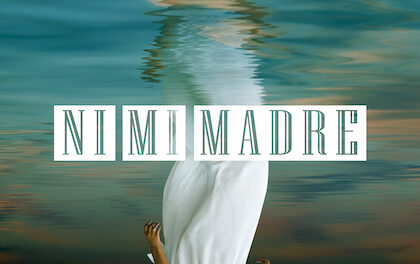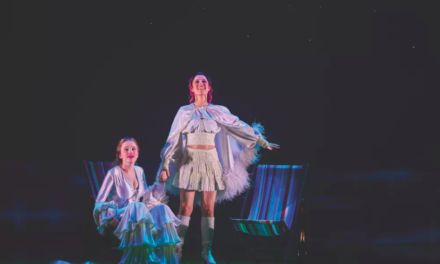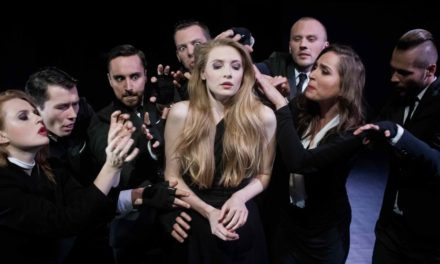Olfactory perception – Shostakovich conkers? Whilst I am in the moron category regarding love of opera, I did once summon from my innards some appreciation of the genre 10 years ago. This was the red-letter day when I clapped eyes and ears on Lady Macbeth of Mtensk by Shostakovich. Even to a layman, and a moronic one at that, the work struck me as a piece of earth-shattering brilliance by a consummate genius. It was therefore with anticipation that I approached the Royal Opera House production of The Nose by the same composer.
The Nose is, to coin the vernacular, an absolute bugger to stage. Written by the possibly-just-the-wrong-side-of-sane Gogol in 1835 it concerns a collegiate assessor, Kovolyov, who loses his nose only to find the same proboscis strolling down Nevsky Prospect in the garb of a general, i.e. a rank higher than his own. Great gag you might think, and perhaps it is if you’re the sort of undemanding viewer that finds Michael McIntyre funny, but it requires explanation. The ranking system of the Civil Service was a social ill of Tsarist Russia of which the arrogant attitude of the Nose to its owner was indicative. Upon your rank depended your position, status, pay and, ultimately, behavior. It tended to result in an almighty scrum to get to the top with, natch, the aristocracy getting first dibs. Why Gogol chose this particular body part has long been a matter for conjecture, it is a matter of fact that the author considered it the most important, with all kinds of other theories, from the Freudian to the Jungian, put forward. My own simplistic view is if like Gogol, you are in possession of a hatchet-sized conk of which you are painfully self-aware, then only satire will provide catharsis. Written when Shostakovich was only 22 it is, of course, a work of staggering precocity. There is no recognizable structure, nor melody, its heralds are gongs, rasps, clangs, and hoots. To the untrained ear it is a cacophony and requires, or at least it seems that way to me, an in-depth knowledge of music for appropriate appreciation.
Whilst Lady Macbeth struck me as a work of depth written by a mature composer, I simply could not, through no fault of the composer, to get within the folds of noise emanating from the orchestra pit, relying on the stage production for greater understanding. Here lay, perhaps, the clue to the success or failure of the Nose – the concurrent between the apparent cacophony and the staging. This was certainly greatly assisted by the lead, Martin Winkler, whose portrayal of the pompous, pitiful, comic Kovalyov required subtlety and absurdity in equal measure. His support, a large cast of comic-book characters, lavishly dressed and made-up, was no less impressive. The costumes, the set – a bleak slate grey semi-circle, were effective. There was an initial shock, however, a fact unmentioned in largely neutral reviews, that the opera was sung in English. This is a major mistake, especially in view of the sous titres available, as Russian language provides a more than adequate structure for such a work, its linguistic subtleties easily the match for English, and I thought the constant use of profanities almost puerile. The very notion of a Soviet production with swearing is a joke. Was this yet another director promoting his own agenda at the expense of the work itself? There was also the vaudevillian approach to the opera which, whilst it may reflect the nature of a, it should be emphasized, short story detaches the viewer from the intricacies of the music itself. At the ROH there are clockwork noses, noses sneezing, noses running, jumping and shouting. There are noses hoisted onto meat hooks. There are bearded hermaphrodites pole-dancing. Whilst it might be a hoot to see nine vast noses can-can on the stage of one of the epicenters of world culture, it cheapened a production which can more than stand up for itself without slapstick. Perhaps I made a mistake in viewing Rozhdestvensky’s Russian language version on YouTube the day after? It is so much more subtle, sharper, shorter, to the point. It is also streets better sung in Russian. Furthermore, though this is no yardstick, I understood it, I ‘got’ it.
At nearly two hours without an interval, the ROH production was too arse-crushing, too tough on the senses, too much an assault on the conscious. I kept thinking that there were pieces inserted that bore no relevance to Shostakovich’s original and, whilst I may be mistaken, I am a stickler for originals as excessive re-interpretation can be unsuccessful. At the Royal Opera House there was too much irrelevancy, frippery, triviality – people even left early, something you normally only see at Arsenal matches. This led me to question, why did I ‘get’ Rozhdestvensky’s version even though I am an amateur? Was it because the production caused me to concentrate on the music, not the staging? Did the one complement the other better, providing harmony, not discourse? I wish I knew, I am no expert. The Royal Opera House produced an opera that ran away with itself, one that was guilty, to quote the odious Pravda, of the “more muddle than music” accusation leveled at Lady Macbeth in 1936.
For further details, please visit the website.
This post first appeared on Russian Art + Culture on November 11, 2016 and has been reposted with permission.
This post was written by the author in their personal capacity.The opinions expressed in this article are the author’s own and do not reflect the view of The Theatre Times, their staff or collaborators.
This post was written by James Butterwick.
The views expressed here belong to the author and do not necessarily reflect our views and opinions.


















